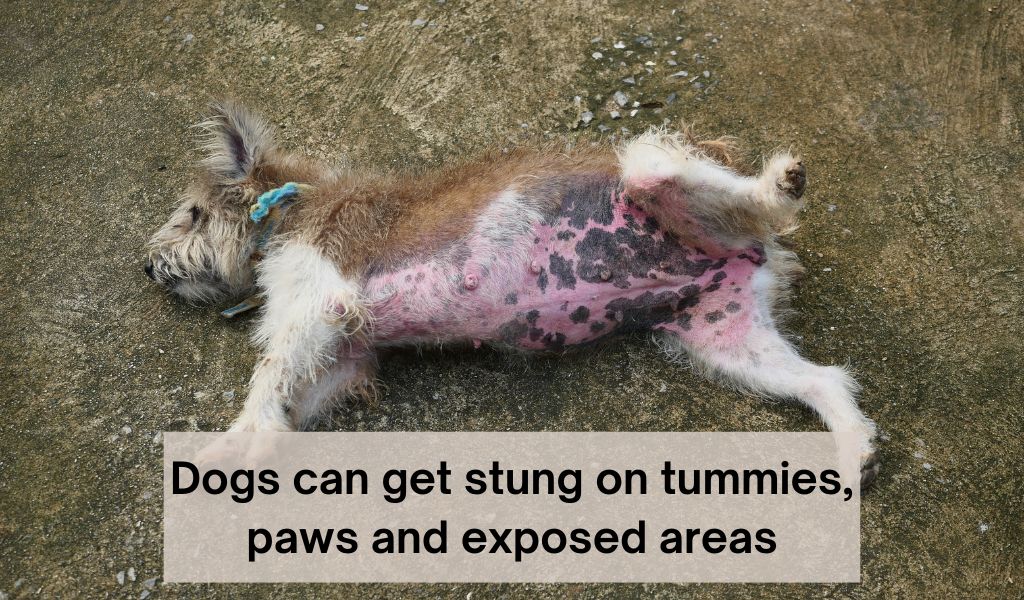Whether you’re out for a leisurely walk, training, working or on a hike, it’s important to be aware of the potential dangers posed by plants and animals.
Stinging nettles are one plant that can cause discomfort if touched, but can dogs get stung by them? Let’s take a closer look at this question.
Yes, dogs can get stung by stinging nettles. The good news is that the sting isn’t usually too serious, and most dogs will recover without any problems. However, it’s always a good idea to know what to do in case your dog does get stung.
What are the symptoms of a dog stung by nettles?
When a dog is stung by nettles, the severity of the reaction largely depends on where exactly on the body it has been stung.
Most commonly, any swelling and pain that occurs will be localised to the area of contact with the nettle, although some animals may have an allergic reaction or manifest more severe symptoms throughout the body.
Generally speaking, touching a nettle can cause itching, swelling and burning sensations that range from mild to severe in intensity.
Other signs of a sting include excessive salivation due to oral exposure, breathing difficulty if a large area of the muzzle or tongue is affected, and lethargy if numerous stings occur throughout the body.
It’s important to monitor your pet closely if you suspect they’ve been stung by nettles – serious reactions can result in shock or anaphylaxis so prompt veterinary attention should be sought if these signs are observed.
Fortunately, in many cases, home remedies such as cold compresses will provide relief for mild symptoms.
If handled properly and treated quickly, dogs that have been stung by nettles can go on to make a full recovery without any lasting damage.

What to do if a dog gets stung by nettles
If a dog gets stung by nettles, the most important thing to do is check the area where they were stung. Nettle stings can often result in a raised red bump with a white pustule at the centre.
To provide immediate relief, run cool water over the affected area and then apply a cold compress.
Do not use ice, as this could cause further irritation and damage the skin. In addition, it’s also wise to keep an eye out for signs of an allergic reaction, such as excessive itching or difficulty breathing.
If these symptoms occur, seek immediate medical attention for your pet.
It is also useful to pay attention to common nettle patches and avoid them in future walks with your dog so that you can better avoid any similar accidents from happening again in the future.
Popular itchy skin relief for dogs
How long does a nettle sting last on a dog?
The duration of a nettle sting on a dog will depend on the severity of the reaction.
Mild reactions may last only a few minutes, while more severe reactions can last up to 24 hours.
If your pet has an allergic reaction or if symptoms do not improve after a few hours, it is important to seek veterinary attention as soon as possible.
Can a dog get stung by nettles on their paws?
Dogs can get stung by nettles on their paws, however it’s unlikely due to the stinging area of the plant.
The part of the nettle plant that causes irritation is located on the leaves and stems, so it’s unlikely that their paws will come into contact with these areas.
However, it’s not impossible for a dog to get stung on his paws and , if this does happen, treatment is the same as any other nettle sting – cold compresses and monitoring for signs of an allergic reaction.
It’s important to take caution when walking in areas known to have stinging nettles, as it’s always better to be prepared than sorry.
Final Words
Nettle stings can be an uncomfortable experience for dogs and their owners, but with proper understanding of the plant itself and how to treat a sting, it’s easy to prevent any lasting damage.
It’s important to pay attention to nettle patches in areas that you walk your dog frequently and avoid them where possible.
If a sting does occur, make sure to act quickly by providing immediate relief with cold compresses, and keep an eye out for symptoms of an allergic reaction. In most cases, your pet should make a full recovery without any problems – but it’s always best to be prepared.










